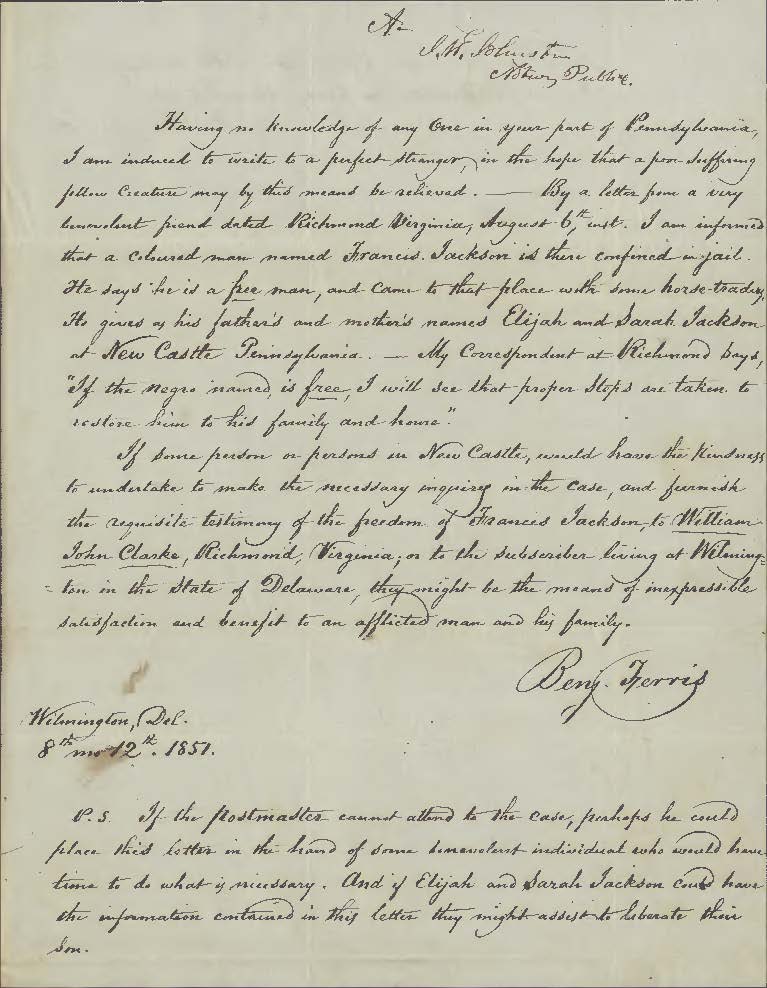The 2013 film 12 Years a Slave adapted the historical memoirs of Solomon Northup, a free African American from New York who was kidnapped and sold into slavery in the 1840s. Two conmen infamously drew Northup to the slave-owning territory of Washington D.C. with the promise of work, only to capture and sell him into slavery upon his arrival. This kidnapping scheme was both brutal and efficient. What it was not, unfortunately, was unique. One 1855 Campbell County Chancery cause, Francis Jackson vs. John W. Deshazer, centered on the similar experiences of Francis Jackson, an African American man who was claimed as a slave by his employer after their work brought them to northwestern Virginia.
Francis Jackson was born in Mercer County, Pennsylvania, in 1816 or 1817. Witnesses in his defense testified that his grandmother Peggy had been enslaved in Pennsylvania when the state passed the Gradual Abolition Act of 1780. The act, one of the first pieces of emancipation legislation in the United States, stipulated that all children of Pennsylvania’s enslaved people born after the law’s passage were to be freed by the time they were 28 years old. Peggy’s daughter Sally, and all of her future children, were thus considered legally free after Sally turned 28 in 1813. Sally then married fellow free person of color Elijah Jackson. The couple had several children together, with Francis being the oldest. The family was well known to their neighbors, many of whom noticed when Francis never returned home after leaving to work for Charles May, a stranger to the area.
According to Jackson, May had asked him to help drive his horses to a market in Ohio. Jackson was concerned at the time about what would happen if their travels brought them through Virginia, a slave state. He refused the work until May promised to vouch for Jackson’s freedom. However, when they eventually crossed the Virginia border, May instead brought Jackson to the Campbell County Court House, where he enslaved Jackson without his knowledge to a man named Samuel Scott.
A Virginian witness in the freedom suit claimed to have been present at the court house that day. This witness insisted that Jackson admitted to being an enslaved man from Harrison County, Virginia, who had once belonged to May’s father, and that he made no mention of his possible freedom. But Jackson tried to escape multiple times over the next eight to ten months. He was eventually caught and brought to the Botetourt County jail. Here, he initiated his first freedom suit against Samuel Scott on the grounds of his fraudulent enslavement.
At the time, the suit was dismissed. Scott paid Jackson’s bond and enslaved him to John W. Deshazer. Jackson continued his efforts to escape, finally succeeding when a boat that he was traveling on was briefly stopped at a landing. He was found in New London and brought to the Campbell County jail where he initiated his second freedom suit, this time against Deshazer.
Unlike in his original case, Jackson was able to find sympathetic listeners to take up his cause. One man, Benjamin Ferris, reached out to Jackson’s local community in Pennsylvania in hopes of locating witnesses who could testify in support of Jackson. Ferris began to correspond with John Reynolds, a Pennsylvania judge familiar with Jackson and his parents. Reynolds in turn forwarded several affidavits describing Jackson and his family to Campbell County officials. One such official responded with a refusal to accept Jackson’s freedom unless he was identified and defended by a white witness.
Several Pennsylvania witnesses were ultimately able to submit depositions in Jackson’s case. They each offered a consistent and detailed description of Jackson’s family, their freedom, and Jackson’s eventual disappearance with May. They also offered a consistent picture of Jackson himself—a stout man with a bit of a stammer, who loved music and played the fiddle with his left hand.
After a twelve-year ordeal, witnesses for Solomon Northup also were able to help him regain his freedom and return to New York. His memoirs describing his enslavement became massively popular and fueled the growing abolitionist movement in the North. But the fates of other victims of kidnapping and enslavement schemes, like Jackson, have often remained far more ambiguous within the historical record.
Francis Jackson disappeared from the Campbell County jail before a final decree could be pronounced in his case. In the end, the judge chose to discontinue Jackson’s case without prejudice. This meant that the evidence could be returned to should Jackson ever be rediscovered and “it appear that he is held in slavery, either by the defendant, or any other person.”














